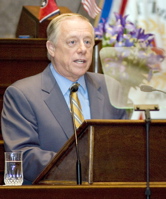Bredesen’s State of the State address: Improving education, job creation and health care are main priorities
 NASHVILLE-Governor Phil Bredesen last week delivered his seventh State of the State Address to the members of the 106th General Assembly, outlining a path forward that will ensure Tennessee’s financial position remains sound while focusing on the basics: improving education, job creation and health care.
NASHVILLE-Governor Phil Bredesen last week delivered his seventh State of the State Address to the members of the 106th General Assembly, outlining a path forward that will ensure Tennessee’s financial position remains sound while focusing on the basics: improving education, job creation and health care.
The Governor acknowledged the overwhelming issue right now is the state of the national economy – the worst since World War II – and its impact on the people and the government of Tennessee.
“We can’t fix the national economy, but we can do everything in our power to support the people of our state through these times, and we can keep our eyes on the basics and make sure we are positioned in the best possible way when the economy improves again,” Bredesen said.
“One immediate concern is health care. When people lose their jobs, they often lose their health insurance as well,” the Governor said. “We know that additional people will qualify for TennCare, and we are planning for that in the budget. We have opened CoverTN up to those who have lost their jobs, and trust that this will help some as well.”
Bredesen underscored the need for a national solution for health insurance. “This recession has truly underlined for me something that I’ve believed for a long time: that we need a national solution for health insurance. Our health care system has become antiquated and unfair, and I deeply hope that a new President and a new Congress can fashion the solution that Tennessee and America deserves,” he said.
The Governor called for continued progress on his number one priority – education – pointing to the state’s work over the past year to revise standards and establish new rules for the certification of teachers to attract highly qualified teachers from a broader pool of talent. He also urged the state’s higher education officials to work with him and the General Assembly to keep higher education affordable, get more kids to graduate, and create a true 21st century higher education system for Tennessee.
“The costs of Tennessee higher education continue to grow, and the ability of state government to cover them is limited,” Bredesen said. “That has meant raising tuition, and every increase means that much more difficulty for some student, that much more likelihood of abandoning the dream of a college degree. It’s time now to fix that.”
Bredesen’s third basic is job creation. Tennessee had major successes in the past year with Volkswagen in Chattanooga and Hemlock in Clarksville among the biggest catalysts for job creation.
Bredesen also pointed to clean energy technology as an area that holds tremendous promise for job creation in Tennessee and proposed development of a Solar Institute as the basic research leader in making solar power practical.
“We are extraordinarily well-positioned here and in the next couple of years, I want to wrap this up even tighter,” Bredesen said. “Solar power today is a tiny part of the power equation. It remains far too expensive, and it’s ripe for breakthroughs, but there’s a lot of basic science to be done. We have the building blocks here in Tennessee to be major players in this.”
Bredesen and the leadership of the General Assembly last week agreed the administration would delay filing the proposed FY 2009-2010 budget until details of a potential federal stimulus package are known.
“It is clear that we will have a substantial amount of money to help soften the blow of this economy,” Bredesen said.
“Please let me make it clear,” he cautioned, “that no proposed version of the stimulus bill is any panacea or silver bullet; substantial cuts are still needed under any circumstances. Furthermore, it is vital to remember that this stimulus money is one-time funds.
“While there are doubtless states that will use this money to simply push the problem back two years, Tennessee will not do this. When we present a budget in March, we will recognize the money we receive as temporary help, and present a multi-year outline for how we will use these funds to ease the transition from current spending levels to what we anticipate for 2011 and beyond. In other words, we will use them to help soften the landing, not to ignore that the hard ground is there. And we will remain cautious about the use of rainy day funds, as no one knows how long this recession will last.”
The Governor urged lawmakers to remember the basic budget principles he laid down six years ago that reflect the values of Tennesseans.
“The principle of the “family budget,” in which we honestly appraise how much money is coming in and spend that much and no more, sticking to the basics, and bipartisanship have worked well for us these past six years, and are even more important as we gather here tonight in these extraordinary circumstances,” Bredesen said. “We are the government of our state. We have a responsibility to conduct its affairs carefully, and we have some tough decisions ahead. But remember this: if it’s tough for us, it is much tougher for millions of Tennesseans, and we must never set ourselves apart from the people we work for.”
